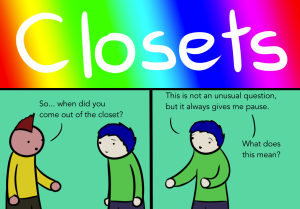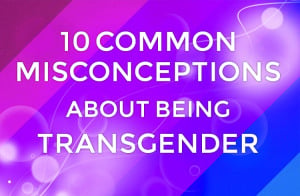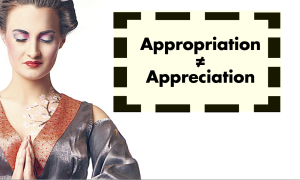Hey, Internet. It’s November again (how did that happen?) — which means it’s time for a lot of things that you’ve been missing for the past year, like outrageous heating bills, snow, and the pain in the ass that is the holiday season.
Now don’t get me wrong. I’m all about holiday cheer. I like giving thanks and giving gifts! But I gotta tell you: This season can be really stressful for people in eating disorder recovery. And unfortunately, some people get so amped up about stuffing and mashed potatoes and advent calendars and egg nog that they forget that not all of us feel comfortable with copious amounts of food being shoved in our faces.
So, if someone you love is in eating disorder recovery this holiday season, here are five ways to support them.
1. Educate Yourself
Step one to understanding eating disorders is—well—understanding eating disorders. Before proceeding in supporting a loved one in need, it’s important that you check your biases and misconceptions at the door.
Do your research by reading a book, watching a documentary, or looking into the published personal stories of people who have struggled with eating disorders.
Remember that your loved one does not have to be your first point of contact for information on what it’s like to experience an eating disorder — or recovery. There are thousands of resources available to you with a quick Google search.
And the National Eating Disorders Association website is always helpful.
A little bit of effort in the way of education can go a long way in preparing you to take the right steps — so check the video information box for more!
2. Be a Good Communicator
Be a presence in your loved one’s life, but not a pressure. Listen if they wanna talk, but don’t force it.
Try not to be critical or judgmental of what your loved one tells you, even if it’s hard for you to hide your initial reactions. Try counting to five or ten before you say anything. And remember that your body language speaks volumes. Check your face.
Avoid giving advice. Remember that your loved one needs control over their body back. If you want to, you can offer gentle suggestions, but avoid telling your friend what they “should” do.
Telling them to “go ahead and eat something” really isn’t helpful. Someone struggling with their mental health really doesn’t need your disappointment compounding it.
Instead, validate their feelings and normalize their experiences. Be someone they can trust to go to if they’re having a hard time.
If you’re confused about something or want more information, just ask. Only the person in front of you is going to be able to tell you how best to support them.
3. Avoid Body Talk
I dunno about you, but literally every single time that I see my family after not having seen them for a while, they wanna talk about how my body looks. No!
Usually this is just about the fact that people don’t know how better to small talk. And since we’re so inundated with messages that say that our outward appearance is important — and, apparently, interesting conversation topics — some people really just don’t know that what they’re saying can be harmful.
General rule of thumb: Don’t draw attention to your loved one’s body — or try to validate their experience by talking about your own weight or body image.
Body-specific compliments may be said with good intentions, but they can actually be really damaging to a person in recovery. Well-meaning compliments can be distorted, so it’s best to avoid them.
Remember that what might feel like a throwaway comment about your own body — “These jeans feel really loose,” “I feel so fat today” — can really trigger someone with an eating disorder.
Instead, focus your attention on the person’s non-body-related accomplishments! Turn the attention away from the physical.
This is difficult to do in a culture where we talk very openly and often about our bodies — and especially our dissatisfaction with them. So it might take some practice. Try practicing not talking about people’s bodies — including your own — for a week before the big holiday.
4. Be Sensitive Regarding Food and Numbers
Food and numbers are great causes of stress for people with eating disorders! So remember this when planning gifts and activities. Food and clothes don’t make good gifts or activities.
And if you’re eating in the presence of someone with an eating disorder, avoid mentioning their food intake. Comments like “You can have more than just salad” or “Wow, you really like that cake” are just—no—just no—don’t—no.
Because numbers often define — and therefore haunt — people with eating disorders, people in recovery need to train their to stop constantly making calculations. Therefore, avoid any food- or weight-related numbers, even in reference to yourself.
Basically, just be cognizant of your words.
And when in doubt, ask what someone’s triggers are.
5. Remember Your Own Self-Care
It is not your responsibility to cure someone, nor is it possible.
Being there to support someone in recovery is a beautiful gesture, and you’re doing something wonderful for that person. But don’t forget yourself.
It’s okay if it becomes overwhelming. It’s okay if you need to step back. It’s okay to be confused, and it’s okay to have questions.
Take care of yourself. The important thing is that you’re trying to help.
So go ahead. I know you already have a mile-long list of things to do before the holidays. May as well add “Be a better support for so-and-so.”
And please, everyone, have a fun, safe, and healthy holiday season.
And if you need any support over the holidays, particularly Thanksgiving, please tweet me, and I’ll be there for you to talk you through it.
You deserve happiness and health, and we can support each other.




















